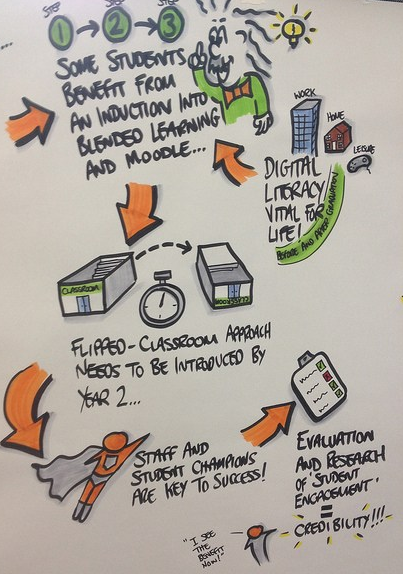Students are more than students, these words, taken from Paul Chapman’s presentation, became a kind of mantra for the two day Change Agents’ Network (CAN) event in Birmingham last week. Paul was alluding to the multitude of roles students play at Birmingham City University to add value to the overall learning experience, from mentor and collaborator, to expert and leader (to name but a few), and this clearly struck a resonance with the audience, evidenced by the plethora of innovative projects and practices shared over the two days.
With over a hundred delegates (and a refreshing number were students) and many more contributing through online channels, the CAN event showcased how staff and students are successfully working together in partnership on curriculum innovation projects across the UK further education and skills and higher education sectors and the buzz during the event and the ideas captured on the ideas wall provided plenty of inspiration for everyone.
(A snapshot of the Ideas Wall, by John Ashton)
The keynote was delivered by Ellie Russell, who drew on her experiences at The Student Engagement Partnership (TSEP) to outline the key principles for effective student engagement. Thinking of students as active game-changers in the learning journey was a recurring theme in Ellie’s address and much of the work being carried out by TSEP. For TSEP, the principles of student engagement should very much be intertwined with the fabric of the institution via an ongoing dialogue with students. Ellie championed student engagement as an iterative process that needs to be revisited and contextualised at each institution, so that all stakeholders have a shared understanding of what student engagement looks like. Therefore capturing student voice is not, and should not, be a product in itself or be seen as a “box ticking” exercise, but instead should be embedded into the processes and structure of the institution itself.
Fostering a culture that engenders democratic, inclusive and participatory values lays at the heart of student engagement and Ellie was quick to point out that there’s an increasing amount of evidence showing that this is starting to filter through into better achievement rates for the students involved. However, what about institutions that are relatively new to revamping their processes to align more closely with student voice? How do they approach student engagement and benefit from the lessons learned from the trailblazers? The message was clear: support is at hand! The TSEP website is currently being updated with a number of case studies and a comprehensive guide due for publication soon. Furthermore, a growing number of excellent resources are also being developed by the Change Agents Network and you can find out more by joining the Jiscmail list or follow #JiscCAN or @CANagogy on Twitter.
On that note of institutions looking for support, I managed to catch up with Dr Mark Kerrigan at Anglia Ruskin who presented one of the sessions at the event on ‘What are the skills needed to be a good change agent?’ and is also responsible for delivering the new SEDA-accredited Institutional Change Leaders’ Award. The free distance learning course is designed to give recognition for those involved in staff-student partnership projects and has just enrolled its first cohort. If you’d like more information about the course please don’t hesitate to contact Mark directly.
My trusty colleague Chris Thomson and I helped out interviewing staff for examples of how staff-student partnerships had worked well within institutions (unfortunately, this meant that I did miss many of the workshops taking place during the event, but some highlights from these can be picked up in my Storify). The focus of the interviews was largely to explore the benefits, not just to the institutions and staff involved, but also with a particular emphasis on the benefits to the learners, and the highlights of these will be made available on this blog shortly. My thanks to all of the staff for agreeing to be interviewed, all of whom gave up time over lunch and breaks between workshops – your contributions are very much appreciated.
If you’d like to find out more about future events organised by the Change Agents Network take a look at the webinar series.

